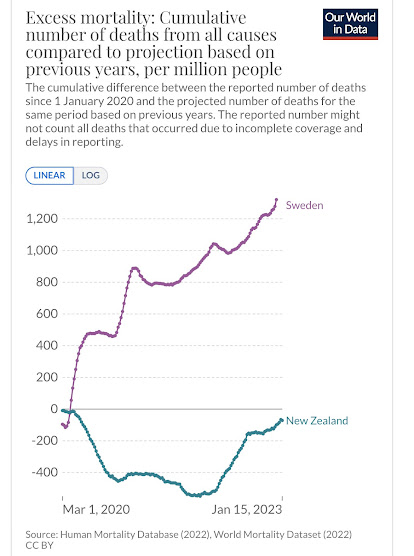He starts by comparing the Swedish response to something we might see on the 1980s British political satire, Yes, Prime Minister. It's the stuff of comedy, except it's all too real. Like Ontario now, their state medical advisor is largely in denial and "downplayed the risks in spite of the overwhelming evidence." He points to a "lack of relevant competence, normalcy bias, and an inability to admit errors" as possible causes of this behaviour.
When we were locking down and wearing masks, Sweden was still pretty confident that the virus wouldn't spread much between people, and anticipated the peak of cases to be just around the corner with far too much optimism given the data. Then they flipped from expecting no infections to a strategy of everyone being infected for the hopes of herd immunity that failed to materialize. They expected it to take ten years to get to a 60% infection rate. But they couldn't keep up with the rate of illness, and "many elderly were routinely directed to palliative care and provided, for example, morphine instead of life-saving care and oxygen." After just the first wave, they had over 5,000 dead and "many more long-term ill with unclear future prospects, many of whom still suffer terribly."
Selective containment, which hoped to avoid infecting people at risk of succumbing to the virus, is impossible: it unduly restricted the lives of the elderly and disabled, and completely "failed to prevent the infection spread in the risk groups." The most vulnerable were forced into longterm isolation, and didn't benefit from avoiding the virus. "Instead they perished, often alone." And while it's possible to predict who will likely die from an acute infection, it's impossible to predict who's at risk of Long Covid. It was left to the "hobby epidemiologists" to do the math to show elected officials and their advisors why this strategy would never work, and that it makes much more sense to protect the population in general.
Scientists who opposed the official plan were denigrated, compared to weather forecasters predicting the weather "by looking at fish intestines," or it was suggested they were out to score research funds or that all the talk about mutations must have come from some imaginative fictional movie. It's interesting to me how authoritarian many democratic countries seem when you consider they just use a different means of silence opposition: they own and operate media instead of military.
In March 2020, Jonas Ludvigsson, one of the original signatories of the Great Barrington Declaration, advocated for infecting children since they don't die of Covid, despite not knowing the long term effects of the disease. His views were criticised internationally by the scientific community, but he was given support from the establishment, who agreed it's just the old who die. They insisted well into June that herd immunity would prevent a second wave. In general, "It was the support from all parts of society that enabled grossly incorrect statements to propagate and turn into the perceived reality of the majority."
By winter 2020, it became clear how wrong they were, and Hallengren insisted, "We did everything we could to reduce the spread of infection." As of the writing, they still don't recommend masks, claim it's dangerous to believe that PPE stops anything, argue that they never said they even wanted to stop transmission, and deny any connection between interventions and outcomes.
Parallels with the tragedy of the commons:
"Progress and innovation is driven by the 'best,' by brilliance and ingenuity. Individual failures become irrelevant. The opposite is true for collective failures, for Covid and the climate catastrophe. These are driven by the 'worst,' those that won't even try, and those that refuse to cooperate. The good cannot compensate."
Parallels with the prisoner's dilemma:
"While the obviously best option globally would be to aim for elimination, it would only work if all cooperated and not cooperating could (naively) be seen as a chance of obtaining a competitive advantage. That was the game that FHM and Sweden gambled on. In essence, it unleashed the tragedy of the commons. . . .
The propaganda on schools, Covid, and children pushed by Swedish officials as well as GBD-signee Ludvigsson, have also most likely had devastating implications far beyond the borders of Sweden."
They went further than anything I've seen here in Canada, including arguing that interventions caused more deaths than Covid and that millions of girls were forced into marriage due to school closures. And governments and economics still embrace the business-as-usual level stability at all costs.
"It is no coincidence that signers of the GBD are backed by climate change deniers. The same crowd used the same argumentation for the need to 'live with climate change,' 'flattening the curve,' and now 'live with Covid.' Each of theses statement has the same components. It sounds reasonable and realistic at first. It obfuscates that there is an alternative. Most importantly, it does not account for tipping points and their concomitant non-linear feedback loops. Instead, the statements are based on inadequate linear and short timescale logic. . . .
For Covid the tipping points are the emergence of new mutated variants that are harder to control due to either higher transmissibility or immune escape. The number of new mutations is proportional to the number of replications, which in tern reflects the total amount of transmission. . . . But the pandemic is not over yet. There is time for change. The central challenge is to drop the prestige, embrace the science on airborne and asymptomatic transmission, and admit past failure. The science of what needs to be done is unambiguous."
ETA: An updated graph (Feb. 2023) of excess mortality in Sweden and New Zealand:


No comments:
Post a Comment